Knowledge sharing and innovative work behavior: The case of Vietnam
As the world is gradually moving towards a knowledge economy, knowledge is increasingly regarded as
the main driving force of the economy. The success of future economies will be based on effective
organizations absorbing, using and enhancing knowledge (Nassuora, 2011). However, most organizations
tend to emphasize too many systems and tools rather than the core component of sharing knowledge among
individuals. Knowledge sharing is valuable for organizations because through organizational knowledge
sharing it is possible to improve efficiency, avoid waste, reduce training costs and risks. The study by Smith
and Mckeen (2003) show that readiness to share knowledge is associated with profitability and productivity
as well as labor costs. Besides, knowledge sharing is a factor that encourages individuals to create
knowledge and convert it into greater power (Liebowitz & Chen, 2001). Knowledge sharing with colleagues
allows individuals to exchange and discuss ideas with peers, draw their attention to the benefits of ideas and
implement ideas by turning into a viable solution (Mura et al., 2013). When employees actively share
knowledge, knowledge is acquired and facilitates lawsuits that promote employees' innovative work
behavior.
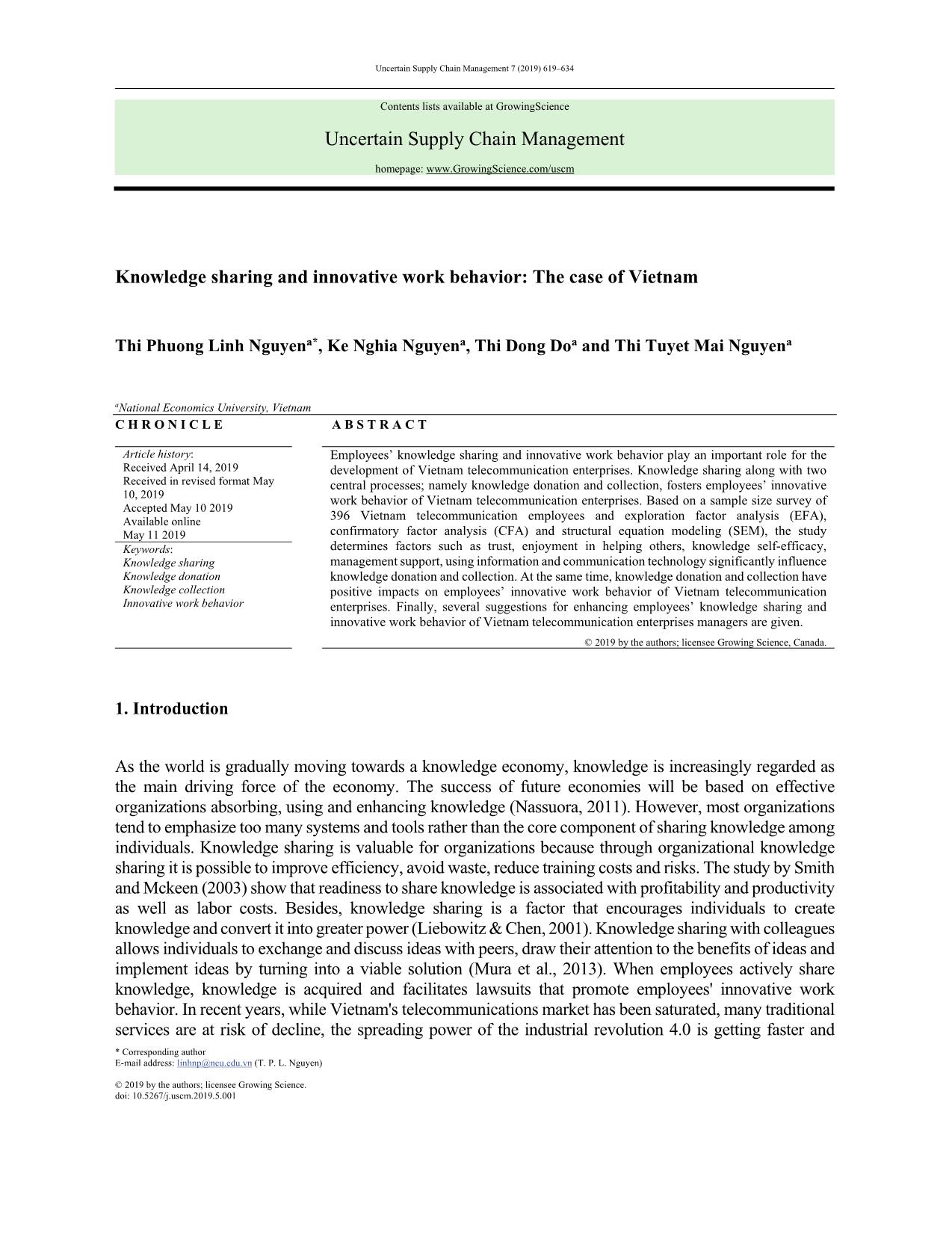
Trang 1
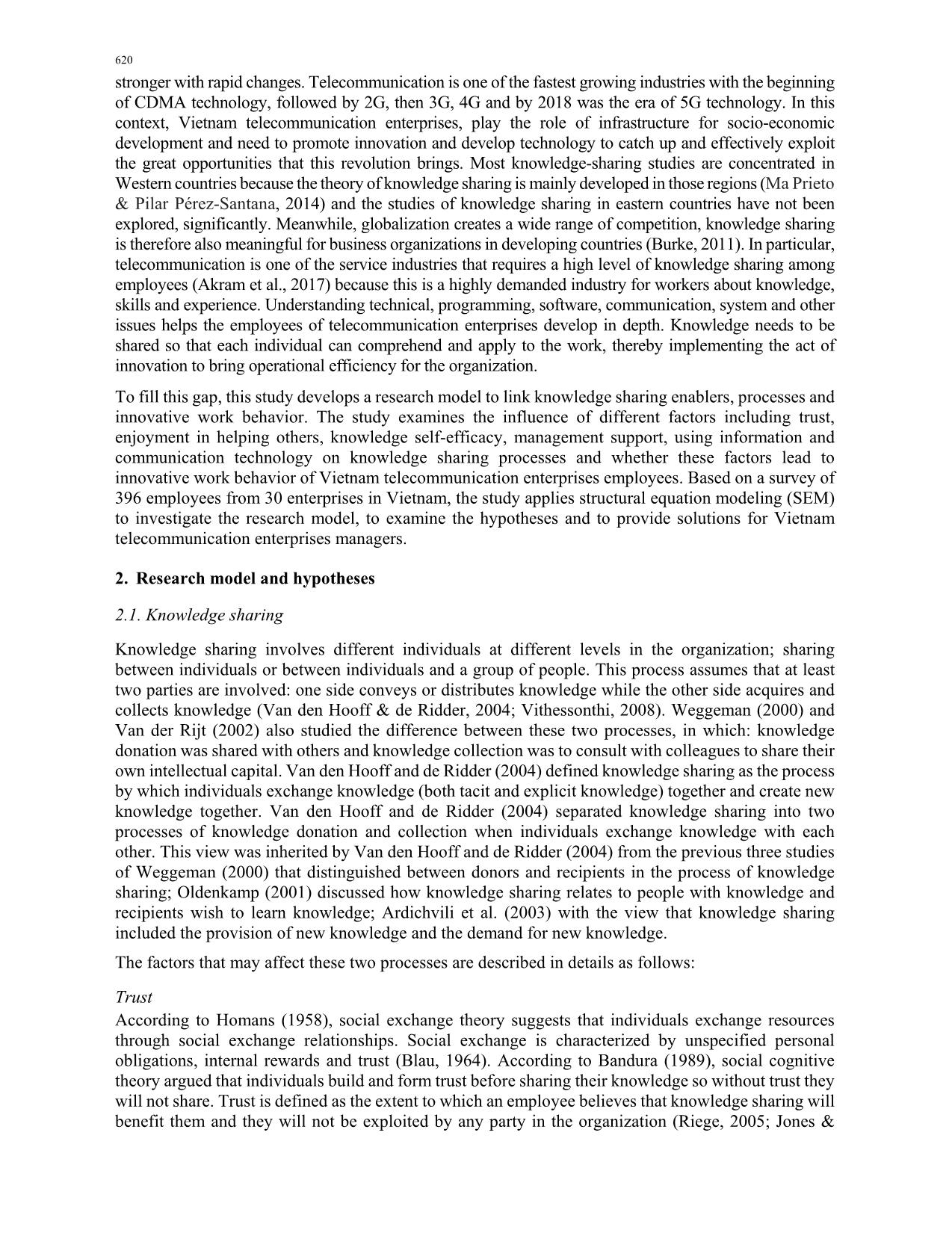
Trang 2
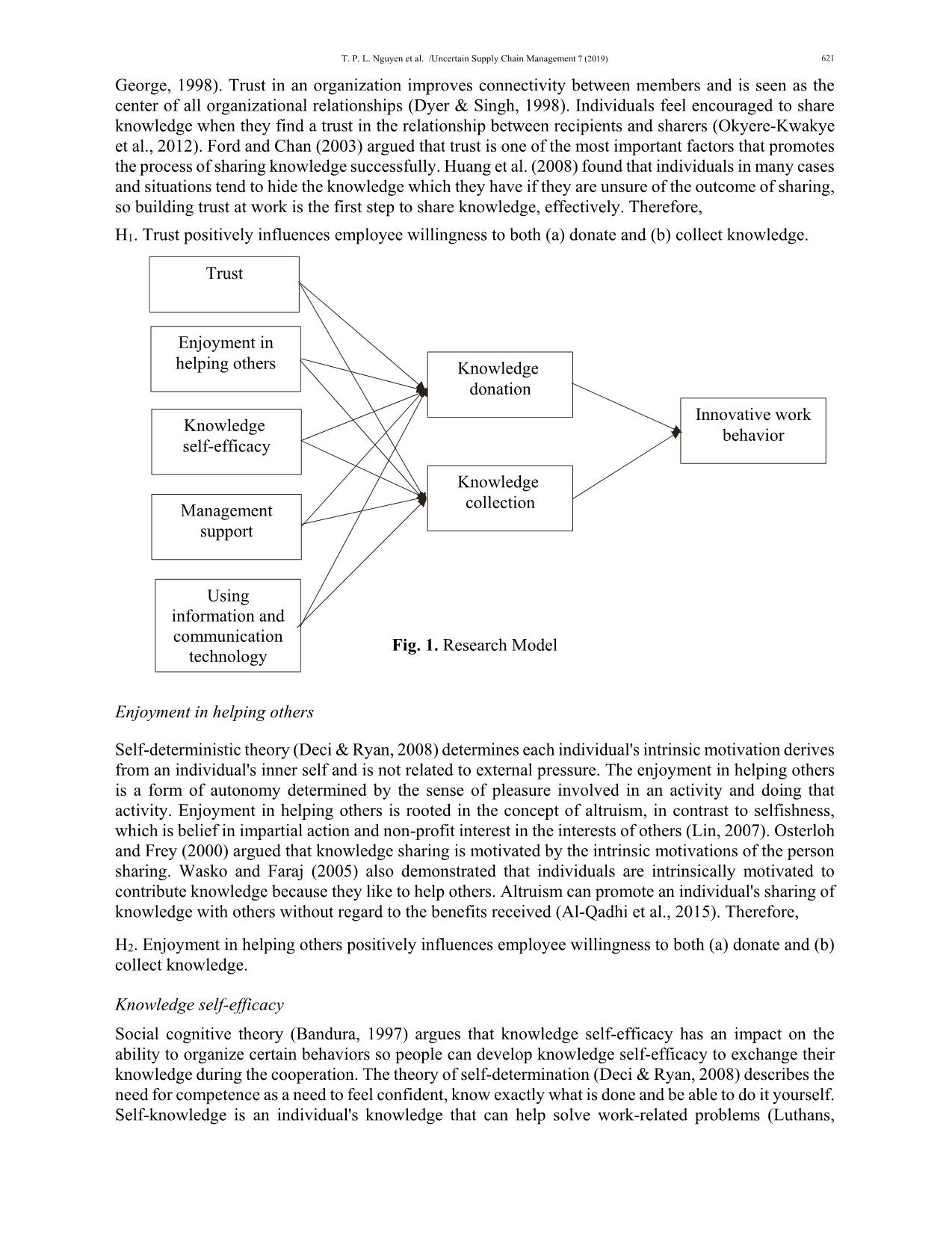
Trang 3
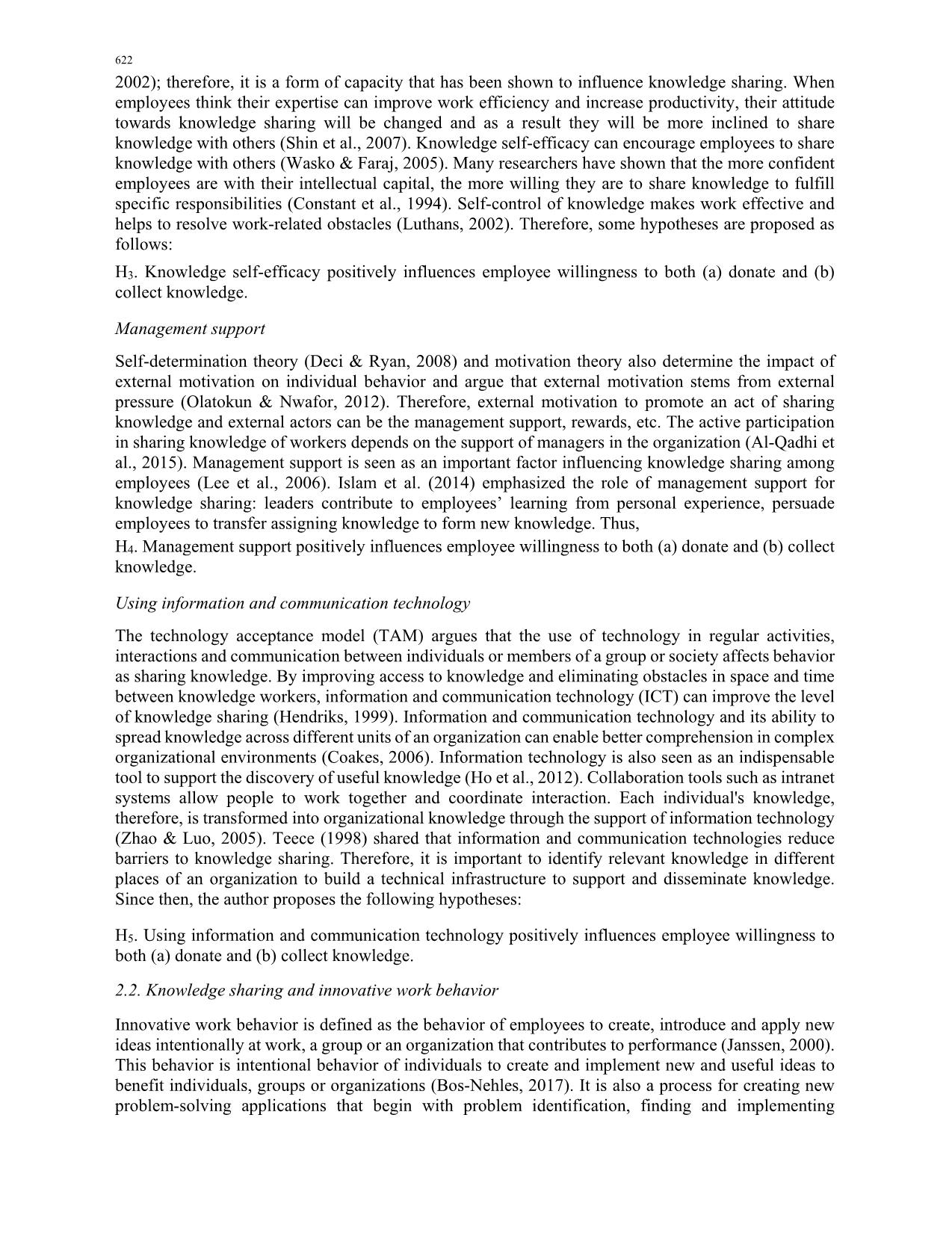
Trang 4
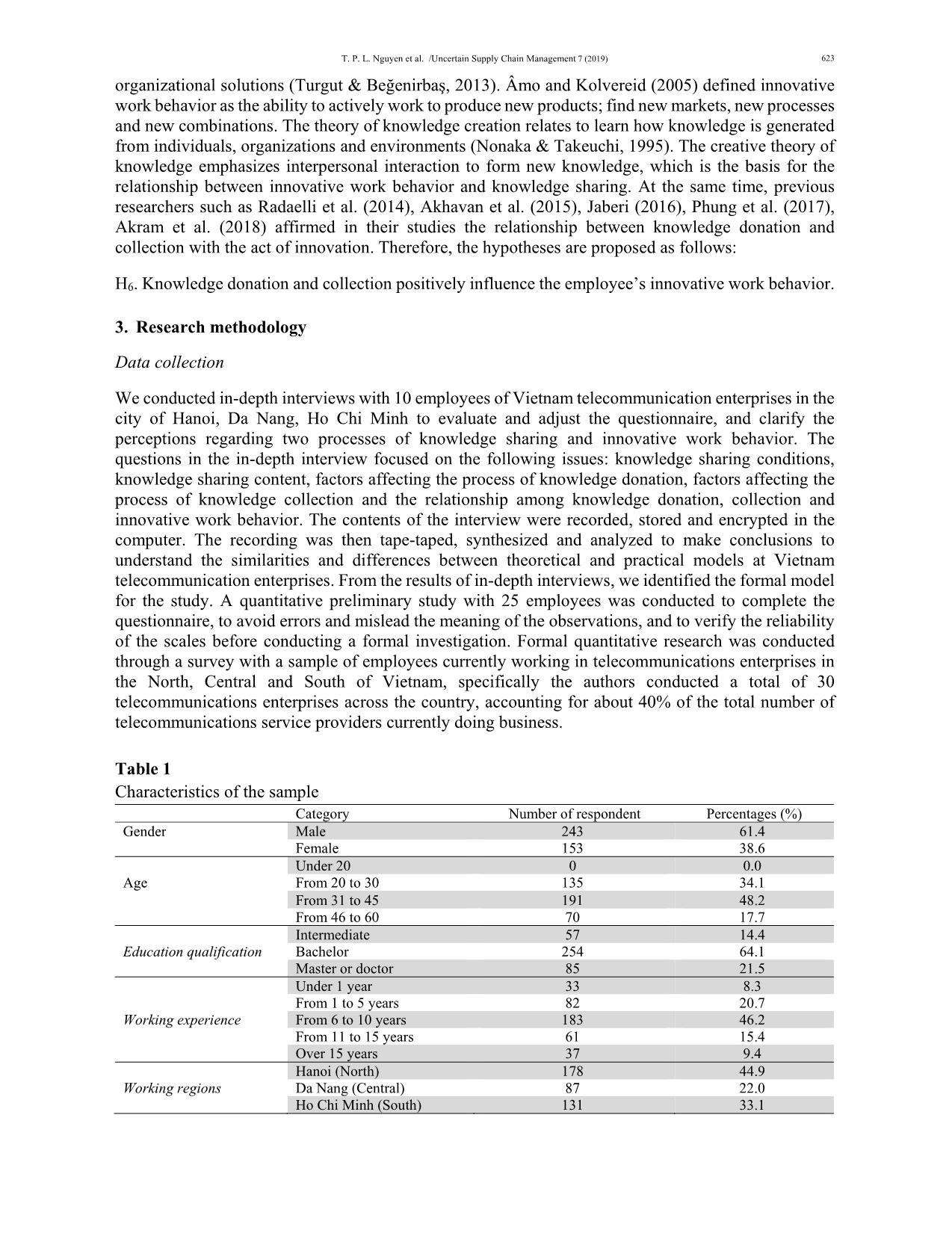
Trang 5
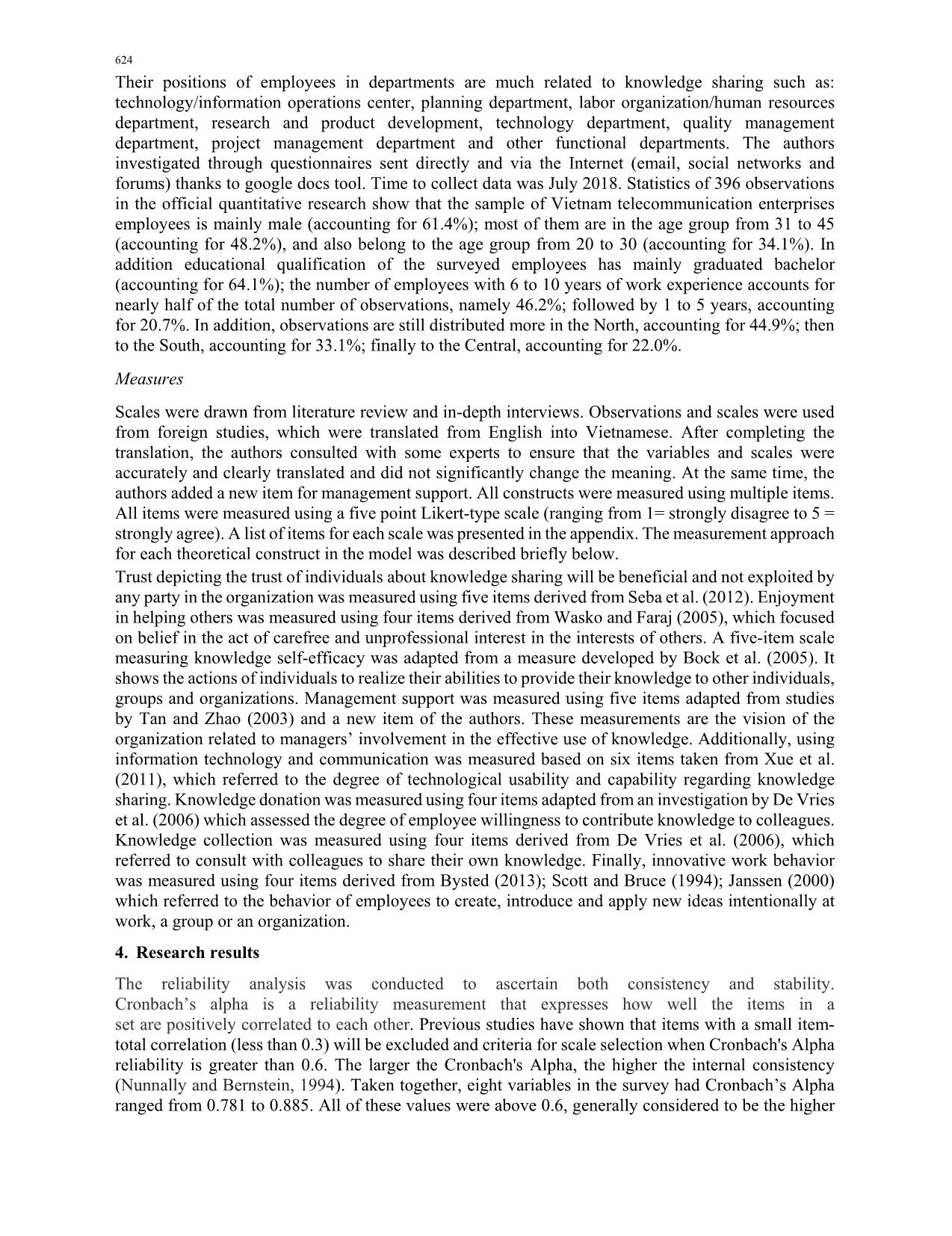
Trang 6
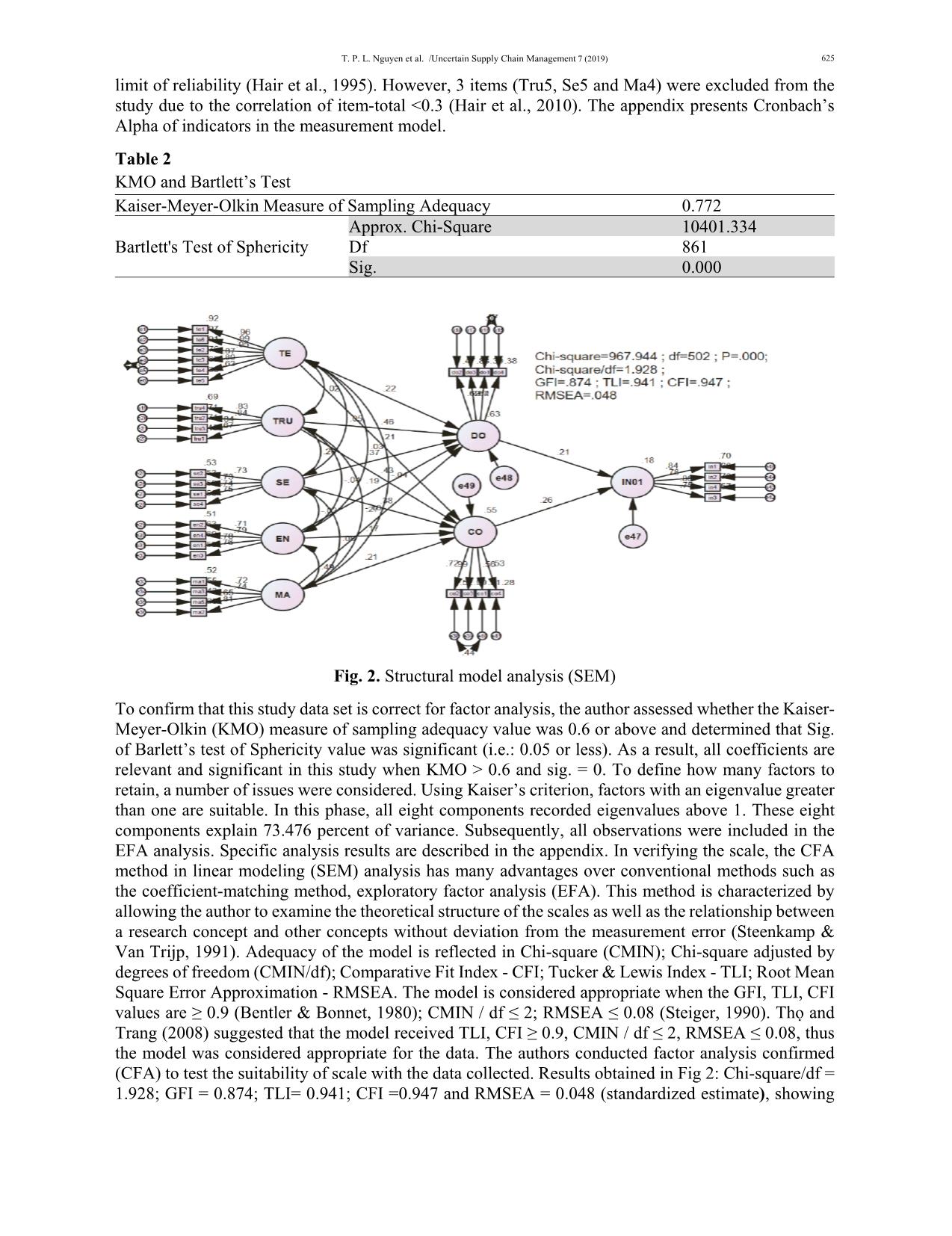
Trang 7
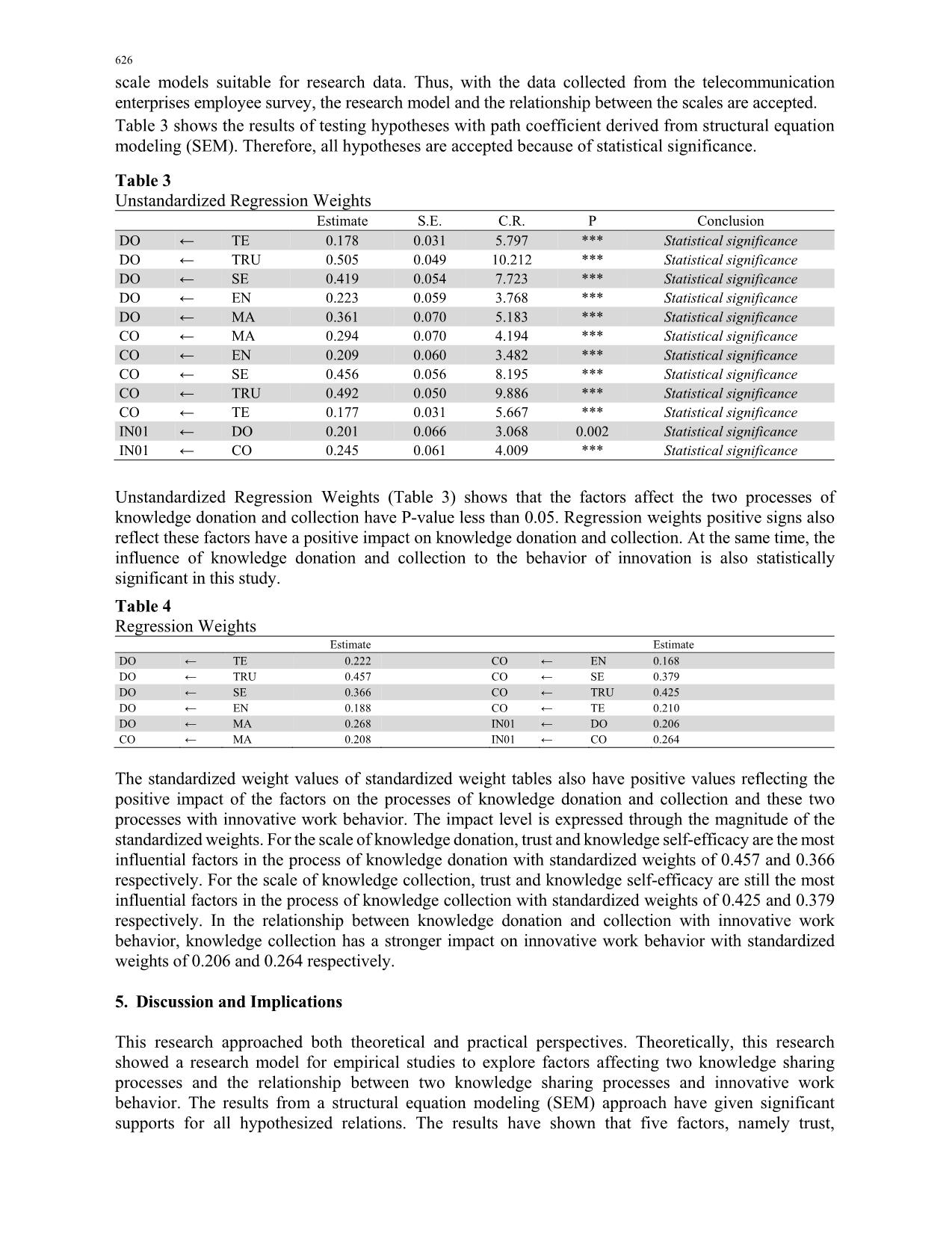
Trang 8
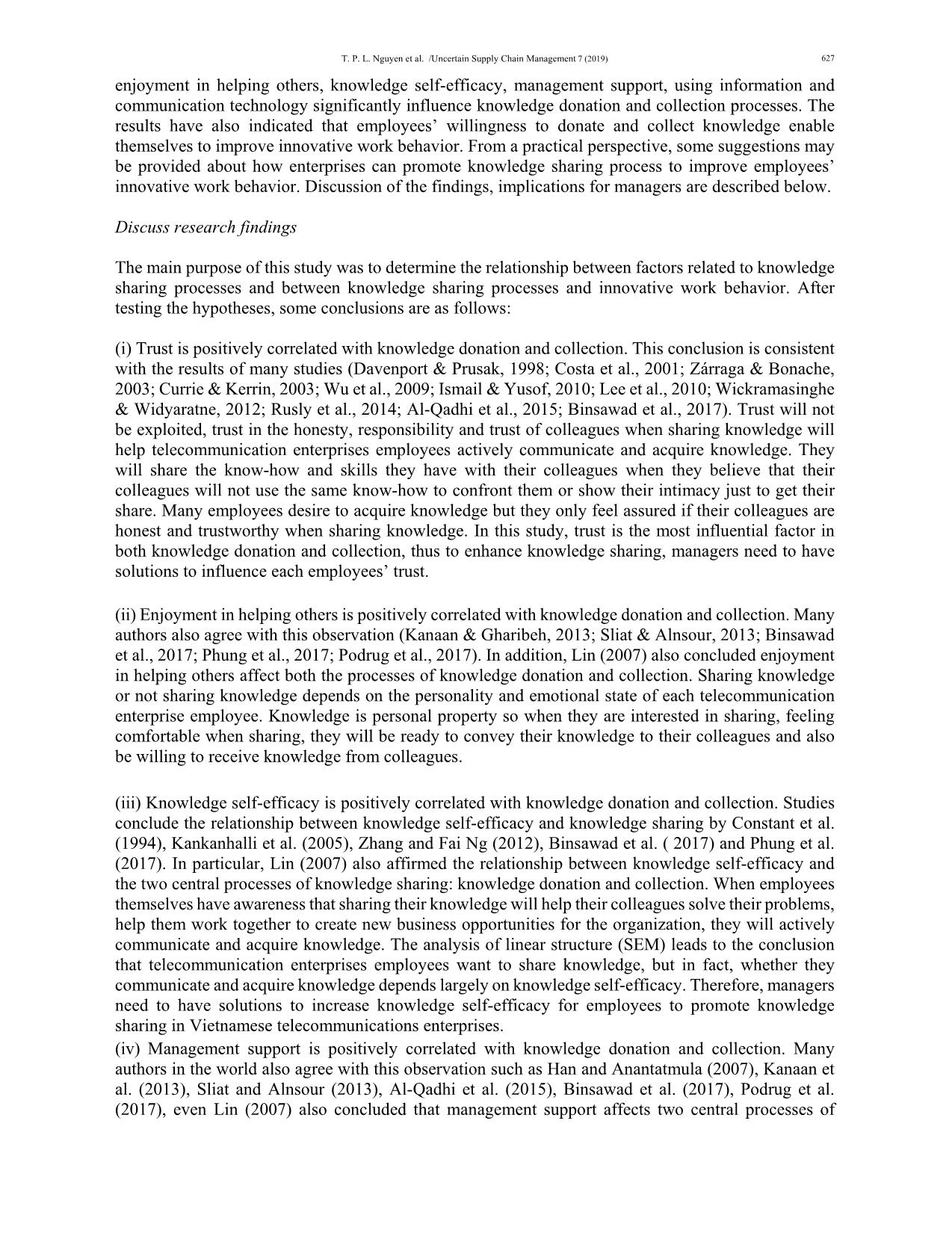
Trang 9
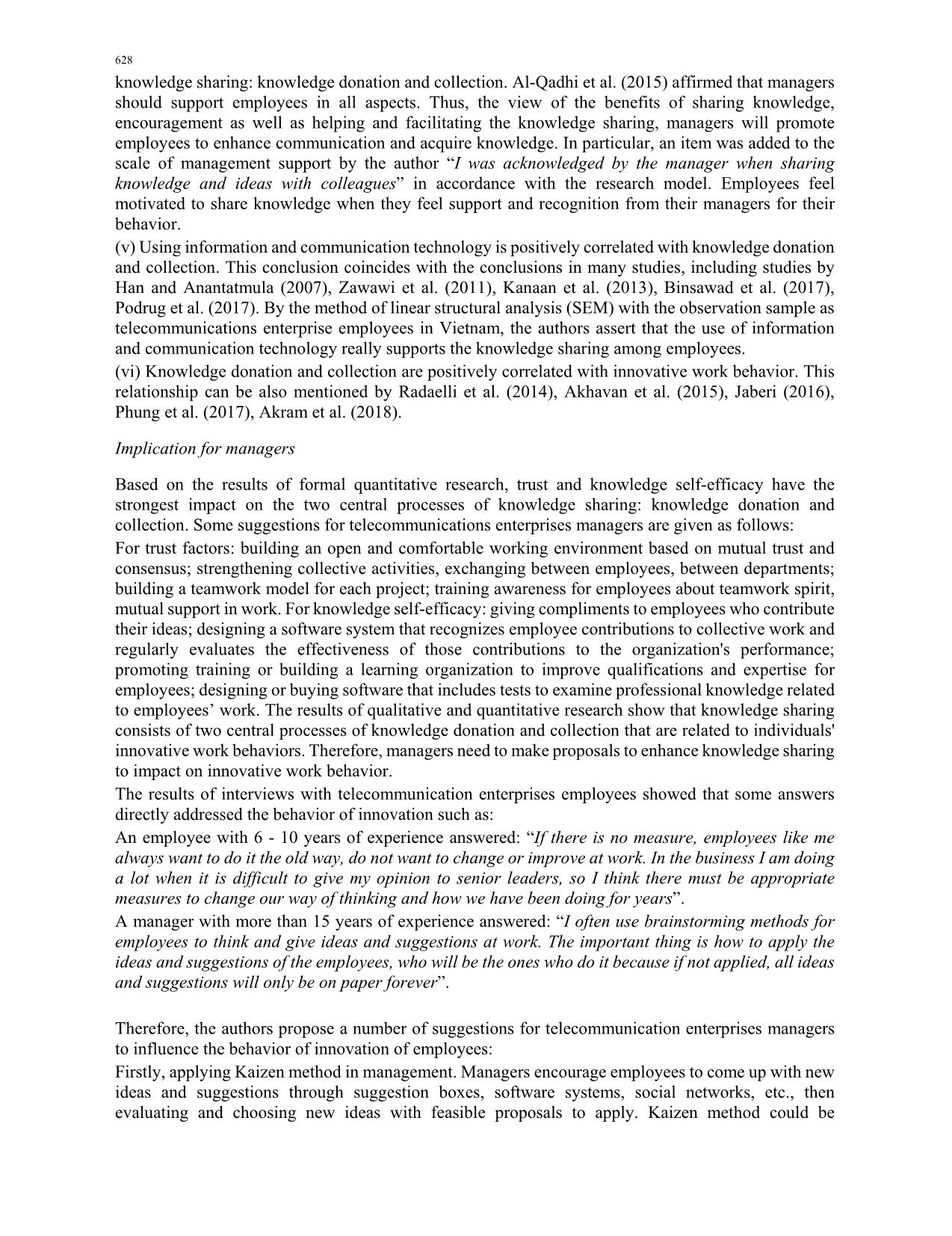
Trang 10
Tải về để xem bản đầy đủ
Tóm tắt nội dung tài liệu: Knowledge sharing and innovative work behavior: The case of Vietnam
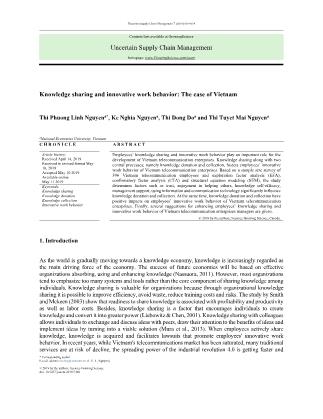
, R. E., Van den Hooff, B., & de Ridder, J. A. (2006). Explaining knowledge sharing: The role of team communication styles, job satisfaction, and performance beliefs. Communication Research, 33(2), 115-135. Deci, E. L., & Ryan, R. M. (2008). Self-determination theory: A macrotheory of human motivation, development, and health. Canadian psychology/Psychologie canadienne, 49(3), 182. Dyer, J. H., & Singh, H. (1998). The relational view: Cooperative strategy and sources of interorganizational competitive advantage. Academy of Management Review, 23(4), 660-679. Ford, D. P., & Chan, Y. E. (2003). Knowledge sharing in a multi-cultural setting: a case study. Knowledge Management Research & Practice, 1(1), 11-27. Hair, J. F., Anderson, R. E., Babin, B. J., & Black, W. C. (2010). Multivariate data analysis: A global perspective (Vol. 7). Han, B. M., & Anantatmula, V. S. (2007). Knowledge sharing in large IT organizations: a case study. Vine, 37(4), 421-439. Hendriks, P. (1999). Why share knowledge? The influence of ICT on the motivation for knowledge sharing. Knowledge and Process Management, 6(2), 91-100. Ho, L. A., Kuo, T. H., & Lin, B. (2012). How social identification and trust influence organizational online knowledge sharing. Internet Research, 22(1), 4-28. Homans, G. C. (1958). Social behavior as exchange. American Journal of Sociology, 63(6), 597-606. Huang, Q., Davison, R. M., & Gu, J. (2008). Impact of personal and cultural factors on knowledge sharing in China. Asia Pacific Journal of Management, 25(3), 451-471. Islam, S., Zeisel, A., Joost, S., La Manno, G., Zajac, P., Kasper, M., ... & Linnarsson, S. (2014). Quantitative single-cell RNA-seq with unique molecular identifiers. Nature Methods, 11(2), 163. Ismail, M. B., & Yusof, Z. M. (2010). The impact of individual factors on knowledge sharing quality. Journal of Organizational Knowledge Management, 13, 1-12 Jaberi, E. (2016). The effect of knowledge sharing on innovative behavior among employee of Besat hospital in city of Hamedan. International Academic Journal of Accounting and Financial Management, 3(4), 41-47. Janssen, O. (2000). Job demands, perceptions of effort‐reward fairness and innovative work behaviour. Journal of Occupational and Organizational Psychology, 73(3), 287-302. Jones, P., & Jordan, J. (1998). Knowledge orientations and team effectiveness. International Journal of Technology Management, 16(1-3), 152-161. Kanaan, R., & Gharibeh, A. A. H. (2013). The impact of knowledge sharing enablers on knowledge sharing capability: An empirical study on Jordanian telecommunication firms. European Scientific Journal, ESJ, 9(22). Kankanhalli, A., Tan, B. C., & Wei, K. K. (2005). Contributing knowledge to electronic knowledge repositories: An empirical investigation. MIS quarterly, 29(1). Lee, M. K., Cheung, C. M., Lim, K. H., & Ling Sia, C. (2006). Understanding customer knowledge sharing in web-based discussion boards: An exploratory study. Internet Research, 16(3), 289-303. Lee, P., Gillespie, N., Mann, L., & Wearing, A. (2010). Leadership and trust: Their effect on knowledge sharing and team performance. Management learning, 41(4), 473-491. Liebowitz, J., & Yan, C. (2004). Knowledge sharing proficiencies: the key to knowledge management. In Handbook on Knowledge Management 1 (pp. 409-424). Springer, Berlin, Heidelberg. Lin, H. F. (2007). Effects of extrinsic and intrinsic motivation on employee knowledge sharing intentions. Journal of Information Science, 33(2), 135-149. Luthans, F. (2002). Positive organizational behavior: Developing and managing psychological strengths. Academy of Management Perspectives, 16(1), 57-72. T. P. L. Nguyen et al. /Uncertain Supply Chain Management 7 (2019) 631 Ma Prieto, I., & Pilar Pérez-Santana, M. (2014). Managing innovative work behavior: the role of human resource practices. Personnel Review, 43(2), 184-208. Mura, M., Lettieri, E., Radaelli, G., & Spiller, N. (2013). Promoting professionals' innovative behaviour through knowledge sharing: the moderating role of social capital. Journal of Knowledge Management, 17(4), 527-544. Nassuora, A. B. (2011). Knowledge sharing in institutions of higher learning. American Academic & Scholarly Research Journal, 1(1), 29-34. Nonaka, I., & Takeuchi, H. (1995). The knowledge-creating company: How Japanese companies create the dynamics of innovation. Oxford university press. Nunnally, J. C., & Bernstein, I. H. (1994). Psychological theory. New York, NY: MacGraw-Hill, 131- 147. Okyere-Kwakye, E., Nor, K. M., & Ologbo, A. (2012). Factors that impel individuals’ to share knowledge. In Knowledge Management International Conference (KMICe) (Vol. 2012, pp. 4-6). Olatokun, W., & Nwafor, C. I. (2012). The effect of extrinsic and intrinsic motivation on knowledge sharing intentions of civil servants in Ebonyi State, Nigeria. Information Development, 28(3), 216- 234. Oldenkamp, J. H. (2001, November). Limitations of managing knowledge sharing. In Proceedings of the Second European Conference on Knowledge Management, Bled, Slovenia (pp. 411-418). Osterloh, M., & Frey, B. S. (2000). Motivation, knowledge transfer, and organizational forms. Organization science, 11(5), 538-550. Phung, V. D., Hawryszkiewycz, I., Chandran, D., & Ha, B. M. (2017, December). Knowledge sharing and innovative work behaviour: A case study from Vietnam. In Australasian Conference on Information Systems. Podrug, N., Filipović, D., & Kovač, M. (2017). Knowledge sharing and firm innovation capability in Croatian ICT companies. International Journal of Manpower, 38(4), 632-644. Radaelli, G., Lettieri, E., Mura, M., & Spiller, N. (2014). Knowledge sharing and innovative work behaviour in healthcare: A micro‐level investigation of direct and indirect effects. Creativity and Innovation Management, 23(4), 400-414. Riege, A. (2005). Three-dozen knowledge-sharing barriers managers must consider. Journal of Knowledge Management, 9(3), 18-35. Rusly, F., Yih-Tong Sun, P., & L. Corner, J. (2014). The impact of change readiness on the knowledge sharing process for professional service firms. Journal of Knowledge Management, 18(4), 687-709. Scott, S. G., & Bruce, R. A. (1994). Determinants of innovative behavior: A path model of individual innovation in the workplace. Academy of Management Journal, 37(3), 580-607. Seba, I., Rowley, J., & Lambert, S. (2012). Factors affecting attitudes and intentions towards knowledge sharing in the Dubai Police Force. International Journal of Information Management, 32(4), 372- 380. Shin, S. K., Ishman, M., & Sanders, G. L. (2007). An empirical investigation of socio-cultural factors of information sharing in China. Information & Management, 44(2), 165-174. Sliat, R. K., & Alnsour, M. S. (2013). Business Innovation through knowledge sharing: An applied study on the Jordanian Mobile Telecommunications Sector. European Journal of Business and Management, 5(18), 8-17. Smith, H. A., & McKeen, J. D. (2003). Instilling a knowledge-sharing culture. Queen’s Centre for Knowledge-Based Enterprises, 20(1), 1-17. Steenkamp, J. B. E., & Van Trijp, H. C. (1991). The use of LISREL in validating marketing constructs. International Journal of Research in Marketing, 8(4), 283-299. Steiger, J. H. (1990). Structural model evaluation and modification: An interval estimation approach. Multivariate Behavioral Research, 25(2), 173-180. Tan, H. H., & Zhao, B. (2003). Individual-and perceived contextual-level antecedents of individual technical information inquiry in organizations. The Journal of Psychology, 137(6), 597-621. Teece, D. J. (1998). Capturing value from knowledge assets: The new economy, markets for know- how, and intangible assets. California Management Review, 40(3), 55-79. 632 Thọ, N. Đ., & Trang, N. T. M. (2008). Nghiên cứu khoa học Marketing-Ứng dụng mô hình cấu trúc tuyến tính SEM. NXB Đại học quốc gia thành phố Hồ Chí Minh. Turgut, E., & Beğenirbaş, M. (2013). Çalışanların yenilikçi davranışları üzerinde sosyal sermaye ve yenilikçi iklimin rolü: Sağlık sektöründe bir araştırma. Kara Harp Okulu Bilim Dergisi, 23(2), 101- 124. Van Den Hooff, B., & De Ridder, J. A. (2004). Knowledge sharing in context: the influence of organizational commitment, communication climate and CMC use on knowledge sharing. Journal of Knowledge Management, 8(6), 117-130. Van der Rijt, P. G. A. (2002). Precious Knowledge. Amsterdam: The Amsterdam School of Communications Research. Vithessonthi, C. (2008). Social interaction and knowledge sharing behaviors in multinational corporations. The Business Review, 10(2), 324-331. Xue, Y., Bradley, J., & Liang, H. (2011). Team climate, empowering leadership, and knowledge sharing. Journal of Knowledge Management, 15(2), 299-312. Wasko, M. M., & Faraj, S. (2005). Why should I share? Examining social capital and knowledge contribution in electronic networks of practice. MIS Quarterly, 29(1), 35-57. Weggeman, M. C. D. P. (2000). Kennismanagement: de praktijk. Scriptum Management. Wickramasinghe, V., & Widyaratne, R. (2012). Effects of interpersonal trust, team leader support, rewards, and knowledge sharing mechanisms on knowledge sharing in project teams. Vine, 42(2), 214-236. Wu, W. L., Lin, C. H., Hsu, B. F., & Yeh, R. S. (2009). Interpersonal trust and knowledge sharing: Moderating effects of individual altruism and a social interaction environment. Social Behavior and Personality: An International Journal, 37(1), 83-93. Zárraga, C., & Bonache, J. (2003). Assessing the team environment for knowledge sharing: an empirical analysis. International Journal of Human Resource Management, 14(7), 1227-1245. Zawawi, A. A., Zakaria, Z., Kamarunzaman, N. Z., Noordin, N., Sawal, M. Z. H. M., Junos, N. M., & Najid, N. S. A. (2011). The study of barrier factors in knowledge sharing: A case study in public university. Management Science and Engineering, 5(1), 59. Zhao, H., & Luo, Y. (2005). Antecedents of knowledge sharing with peer subsidiaries in other countries: A perspective from subsidiary managers in a foreign emerging market. Management International Review, 45(1), 71. Zhang, P., & Fai Ng, F. (2012). Attitude toward knowledge sharing in construction teams. Industrial Management & Data Systems, 112(9), 1326-1347. T. P. L. Nguyen et al. /Uncertain Supply Chain Management 7 (2019) 633 Appendix 1 Factors Symbols Items My colleagues will not take advantage of me on the knowledge that I share with Tru1 them. Tru2 I am sure that the knowledge I share with my colleagues will not be manipulated. Trust (Tru) Tru3 My colleagues are truthful in sharing knowledge with me. Tru4 My colleagues are responsible and dependable in sharing knowledge with me. I believe that my colleagues will not use the knowledge I share with them against Tru5 me. En1 I enjoy sharing my knowledge with colleagues Enjoyment in En2 I enjoy helping colleagues by sharing my knowledge helping others (En) En3 It feels good to help someone by sharing my knowledge En4 Sharing my knowledge with colleagues is pleasurable My knowledge sharing would help other members in the organization to solve Se1 their problems My knowledge sharing would create new business opportunities for the Se2 Knowledge self- organization efficacy (Se) Se3 My knowledge sharing would improve work process in the organization Se4 My knowledge sharing would increase productively in the organization My knowledge sharing would help the organization achieve its performance Se5 objectives Ma1 Managers think that encouraging knowledge sharing with colleagues is beneficial Managers always support and encourage employees to share their knowledge with Ma2 colleagues Managers provide most of the necessary help and resources to enable employees Management support Ma3 to share knowledge (Ma) Managers are keen to see that the employees are happy to share their knowledge Ma4 with colleagues I was acknowledged by the manager when sharing knowledge and ideas with Ma5 colleagues Our organization introduces new technology platforms that enable knowledge Te1 sharing for more effective operations Our organization has expertise in the usage and maintenance of critical Te2 information infrastructure, e.g. intranet, extranet, groupware Using information Our information systems infrastructure is updated regularly to facilitate effective and communication Te3 knowledge sharing and creation technology (Te) Social network systems enable the search and sharing of ideas and information Te4 within the organization and with our stakeholders Te5 Our groupware systems enable knowledge sharing among employees Te6 Our intranet systems enable the sharing of ideas and critical documents Do1 When I learn something new, I tell my colleagues about it Knowledge donation Do2 I share the knowledge I have, with my colleagues (Do) Do3 I think it is important that my colleagues know what I am doing Do4 I regularly tell my colleagues what I am doing Co1 When I need certain knowledge, I ask my colleagues about it Co2 I like to be informed of what my colleagues know Knowledge Co3 I ask my colleagues about their abilities when I need to learn something collection (Co) When one of my colleagues is good at something I ask him/her to teach me how Co4 to do that thing In1 I create new ideas for improvements Innovative work In2 I often search out new working methods, techniques, or instruments behavior (IN01) In3 My ideas generate original solutions to problems In4 I work actively to test new ideas 634 Appendix 2 Factor Item Factor loading Cronbach’s Alpha Tru1 0.697 Tru2 0.868 Trust (Tru) 0.882 Tru3 0.794 Tru4 0.861 En1 0.796 En2 0.915 Enjoyment in helping 0.885 En3 0.717 others (En) En4 0.864 Se1 0.735 Se2 0.813 Knowledge self-efficacy 0.837 Se3 0.775 (Se) Se4 0.683 Ma1 0.742 Ma2 0.643 0.781 Management support (Ma) Ma3 0.777 Ma5 0.581 Te1 0.993 Te2 0.973 Using information and Te3 0.956 0.842 communication technology Te4 0.933 (Te) Te5 0.937 Te6 0.989 Do1 0.939 Do2 0.918 0.790 Knowledge donation (Do) Do3 0.946 Do4 0.933 Co1 0.648 Co2 0.944 0.809 Knowledge collection (Co) Co3 0.713 Co4 0.581 In1 0.696 Innovative work behavior In2 0.757 0.808 (IN01) In3 0.737 In4 0.691 © 2019 by the authors; licensee Growing Science, Canada. This is an open access article distributed under the terms and conditions of the Creative Commons Attribution (CC-BY) license (
File đính kèm:
 knowledge_sharing_and_innovative_work_behavior_the_case_of_v.pdf
knowledge_sharing_and_innovative_work_behavior_the_case_of_v.pdf

